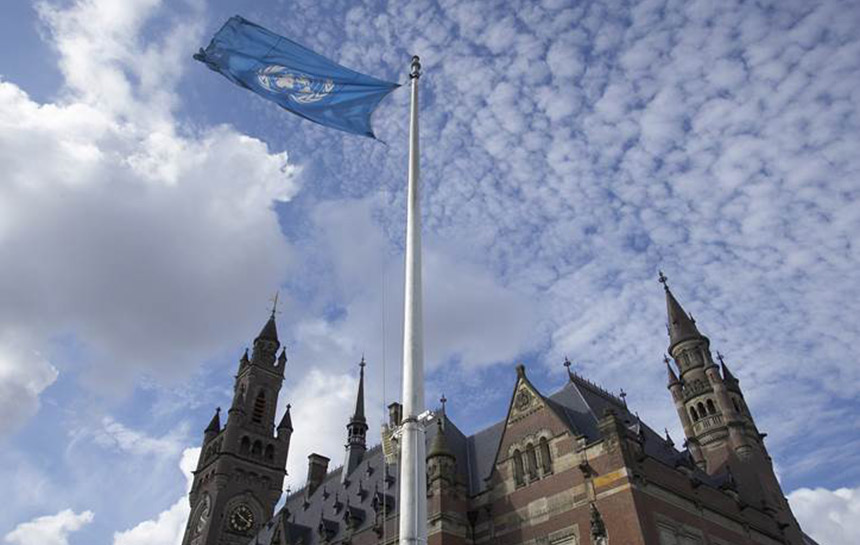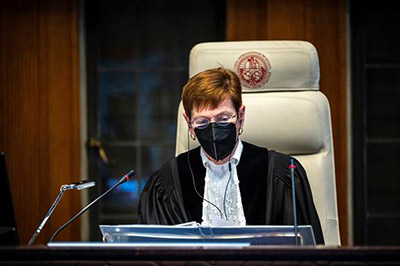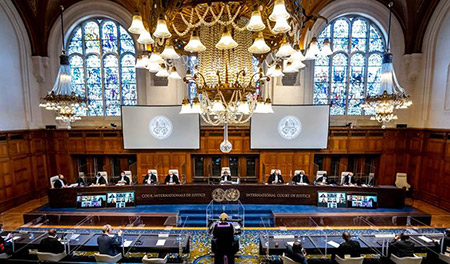
By Andrew Cohen
Joan Donoghue ’81 is used to thinking big. Having served as a judge at the International Court of Justice (ICJ) in The Hague for 10 years, in February she was elected president of the court.
The job itself requires thinking on a global scale. The court, which began its work 75 years ago, decides disputes between sovereign states that often deal with novel and complex issues, and gives advisory opinions to United Nations organs and specialized agencies. Its 15 judges are elected to nine-year terms by the U.N. General Assembly and Security Council, and the president is elected to a three-year term by her fellow judges.
Donoghue earned dual undergraduate degrees in biology and Russian studies from UC Santa Cruz. After graduating from Berkeley Law, she spent three years as a law firm associate in Washington, D.C., before moving to the U.S. Department of State.
In 2010, Donoghue was elected to fill a vacancy at the ICJ. In 2015, she was re-elected. That same year, she traveled to Berkeley Law to receive the Stefan A. Riesenfeld Award. Named after the late professor — who taught her 1L international law elective — the award honors outstanding contributions to the field.
Donoghue often speaks to students, professors, judges, bar associations, civic groups, and reporters about international law’s impact on everything from global travel and commerce to cooperation on law enforcement and environmental protection.
She recently discussed the ICJ, her time as president, and the future of international law.
What sparked your initial interest in international law, and how has it developed over your career?
I became interested in law after writing my undergraduate thesis on an aspect of Soviet law. When I arrived at law school, I had the privilege of studying international law with outstanding professors, including Stefan Riesenfeld and Richard Buxbaum. The more I learned from them, the more convinced I became that international law was the field for me. I followed their advice not to become overly specialized, which has been of great value. I took every available course relating to international law and comparative law and was fortunate eventually to find a position at the U.S. State Department, where I found that my education had equipped me to serve in a variety of positions.
In what ways has your role on the court changed since becoming president?

As president, I have a number of responsibilities in addition to the tasks of each ICJ judge. First, the president has specific functions relating to the court’s judicial activities, including presiding over public hearings, deliberations, and other internal meetings. The president is closely involved in the preparation of the court’s judgments, which are extensively reviewed by all members of the court. Second, the president represents the court in its relations with other institutions, including other organs of the United Nations, as well as state officials. Third, the president supervises the administration of the court, which is under the direct authority of the registrar.
The ICJ recently had its 75th anniversary. How would you describe its influence on international law during time, and what do you see as its greatest challenges ahead?
Over the past 75 years, states have submitted over 140 disputes to the court, and over 25 requests for advisory opinions on legal questions have been referred to it by U.N. organs and specialized agencies. These cases have arisen from all geopolitical regions of the world, and the ICJ has thus lived up to its moniker of “World Court.” A further achievement that should not be overlooked is the court’s development of a significant body of jurisprudence, dealing with an ever-increasing variety of legal issues. The court has proven to be well equipped to address both traditional and newer areas of international law, such as international human rights law and environmental law.
At the same time, the court should not be overloaded with expectations for which it was not designed. We must heed the words of the late Berkeley Law Professor David Caron, who observed in 2017 that, in the absence of robust machinery for international governance, international courts are often “the only tool available; they are screwdrivers that have been asked not only to place screws but also to hammer nails.” He cautioned that if courts are used excessively as hammers, they will cease to function well as screwdrivers.
What are people’s biggest misconceptions about the court?
Outside the circles of practitioners, scholars, and students focusing on public international law, there is an awareness that there exist one or more international courts in The Hague, but there is understandably a more limited appreciation of the names of those institutions and their respective functions and mandates. It is not infrequent for the International Court of Justice to be confused, in public discourse and in the media, with the International Criminal Court or other Hague-based international tribunals. I have been asked about the cases involving Slobodan Milošević, Charles Taylor, and the South China Sea, all of which involve institutions in The Hague, but not the ICJ. The court and the judges must look for ways to explain the particular role of the ICJ.
How has the COVID-19 pandemic affected the operation of the court, and are there any revelations or lessons that can be applied when the pandemic is over?
The court adapted its methods of work to ensure a continued focus on judicial matters during all stages of the ongoing pandemic. We began by holding internal meetings via videoconference and then made a transition to hybrid hearings, with some judges, representatives of the parties, and counsel physically present in the Great Hall of Justice, while others participate remotely by video link. A number of sensitivities had to be taken into account in this transition, including for instance the need to ensure that judicial deliberation takes place with the utmost security and confidentiality, and that all activities are carried out in the court’s two official languages, English and French.

One of the most positive revelations in this context was the speed and efficiency with which the court was able to fully take advantage of modern technologies and implement these new working methods, notwithstanding the above-mentioned complexities. I credit our success to the initiative and hard work of my predecessor, President Abdulqawi Ahmed Yusuf, as well as the registrar and his staff. I also look forward to a return to in-person proceedings in the Great Hall of Justice when conditions permit.
What did you enjoy most about being a student at Berkeley Law, and what was the most meaningful aspect of your time there?
I was not confident as a law student and was intimidated by the prospect of speaking in class and especially of being “called on” by the professor. I was happiest in Professor Buxbaum’s International Business Transactions class. Despite his stature and experience, he taught in an informal atmosphere, never embarrassing us for gaps in our knowledge. For each assignment, he usually paired a J.D. student of U.S. nationality to work with a foreign LL.M. student. This was my first exposure to the diverse styles of reasoning in various legal traditions, an aspect of international legal work that I appreciate even today, working in a group of judges from 15 countries.
What advice would you give to prospective or current law students who want to pursue a career in international law, become a judge, or combine those interests as you have?
I would encourage students to take available international and comparative law courses and to seek out professors who will help them to think critically. I would particularly recommend courses that provide a solid grounding in the fundamental building blocks of international law, and would caution them against over-specializing. Over and over in my career, I have found that my knowledge of one sub-field of international law has helped me in approaching problems on an entirely unrelated topic.
International law is a notoriously competitive field, so academic performance is perhaps even more important than course selection. Resilience and perseverance are other key qualities that aspiring international lawyers should possess. Young lawyers ought not be discouraged from pursuing their preferred career path if they fail to land their dream job in international law upon graduation. Instead, they should cultivate their interest in this area of the law, join regional or national international law societies, and seize every opportunity to gain relevant, hands-on experience.